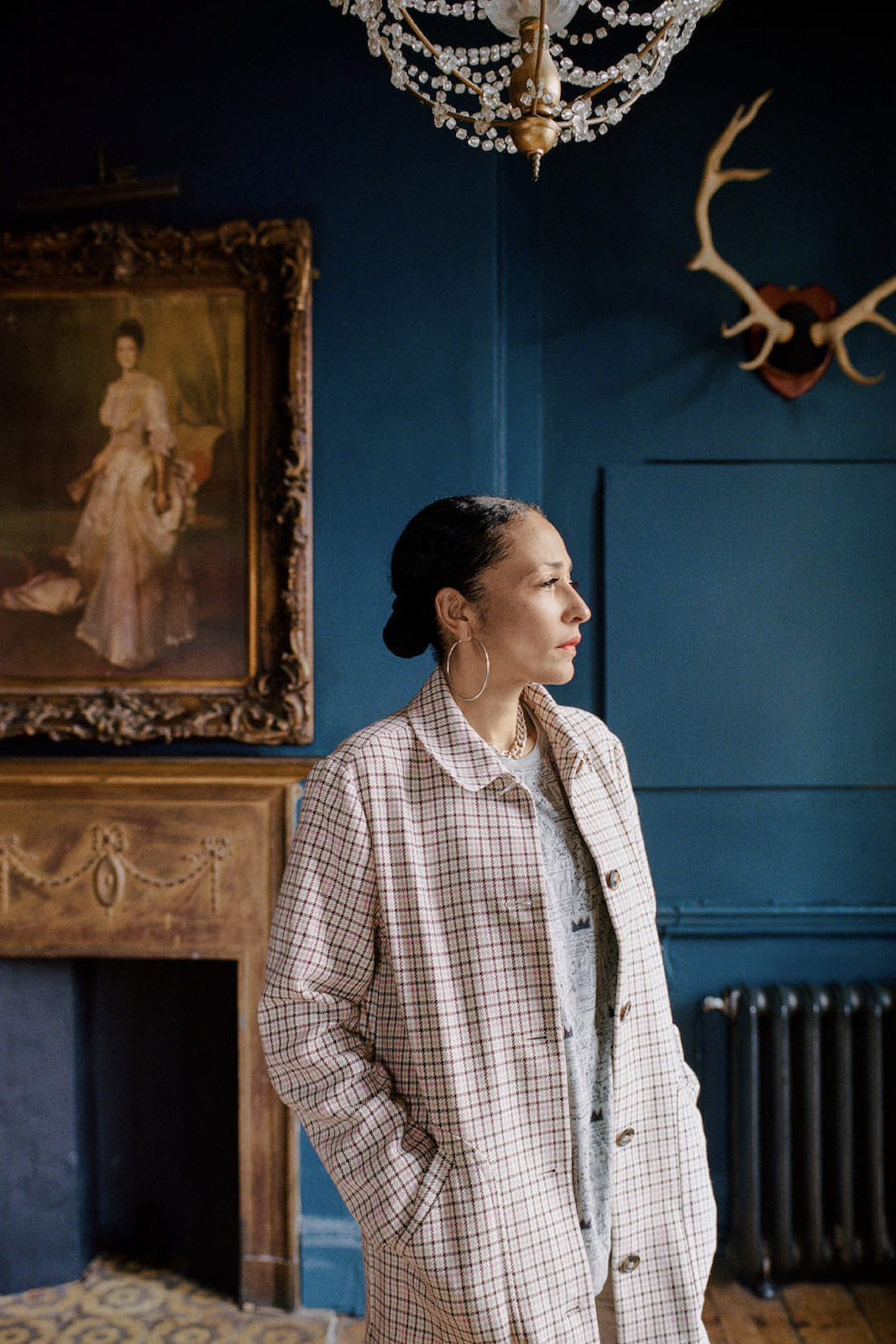British writer Zadie Smith has journeyed far since White Teeth, her debut 2000 novel that marked her as a new millennium star. At the same time, she has stayed distinctly close to home. “I really do live opposite the place I grew up, maybe 20 seconds from the flat I was born in,” she says. “I guess it’s like life in the 19th century—it’s pretty local.”
When we speak, Smith is at her desk in the northwest London neighbourhood that has starred significantly in her life and stories, from her breakthrough novel to works including NW (2012, named for a northwest London postal code), Swing Time (2016), and her 2021 play The Wife of Willesden, a remix of a Chaucer tale.
Her new book, The Fraud, might be viewed as a departure. Its plot passes (perhaps inevitably) through northwest London, but the landscape has unexpectedly shifted to Victorian England. The narrative nimbly melds fiction and fact. We are introduced to characters including the brightly brisk Eliza Touchet, Scottish housekeeper to the failing novelist William Ainsworth (a real-life 19th-century figure). We are drawn into the intrigue surrounding the Tichborne trial: a celebrated legal case that made headlines in the 1860s and ’70s concerning Arthur Orton, a working-class butcher who claimed to be the missing heir to a family title and lavish fortune. We also meet Orton’s key witness: Andrew Bogle, a former slave on the Hope plantation in Jamaica. This appears to be the “historical novel” Smith once vowed to herself she’d never write. Her dreaded Charles Dickens (her other vow was to resist his influence on her writing) even makes an appearance—although his death comes swiftly.
“You’re always trying to refuse something when you’re writing,” she explains. “In this case, I was trying to refuse certain kinds of overdecorated Victorian prose.” She was determined to write the simplest, clearest sentences she could manage—unlike those of William Ainsworth. “That’s some Victorian prose for you. It’s completely impenetrable.”

When I ask how The Fraud took shape, she frowns as she retraces details. She recalls reading a Jorge Luis Borges 1930s short story, “The Improbable Impostor Tom Castro” (named after one of the Tichborne claimant’s guises), which mentions a figure named Ebenezer Bogle.
“I would have noticed the word Bogle because it’s a very Jamaican name, and I must have started wondering whether he was related to Paul Bogle,” she says, referring to the 19th-century Jamaican Baptist deacon and activist. “Then at some point, I wrote a scene in NW about the Tichborne claimant, which isn’t in the final novel. That’s definitely 12 years ago, so I must have been really thinking about it.”
Later, while reading about William Ainsworth, she noticed that one of his writer acquaintances, Edward Kenealy, also happened to be the Tichborne claimant’s eccentric lawyer. “I just took it as a sign or whatever. I’m a little bit superstitious that way.” She smiles. “Victorian London is very small. So it’s not that crazy that people from adjacent worlds would come together or switch worlds.”
“I decided that I don’t need to write an encyclopedic novel. Once I put the guardrails around it, it was just fun.”
Smith has held various academic roles, including as a full professor in NYU’s creative writing faculty. She takes an educated deep dive into history for The Fraud yet also streamlines intricate details into snappy chapters, conveyed with a pace that feels fluid and uncluttered.
“I did a lot of research, but I just made sure not to follow every thread,” she says. “I decided that I don’t need to write an encyclopedic novel. Once I put the guardrails around it, it was just fun.”
She found all sorts of material useful, including University College London’s enormous digitized database of every plantation in Jamaica. “So you can know every name or job everybody did, what skin colour everybody was. You get a very clear idea of what a plantation looks like,” she says, noting that depictions in the media seem stuck in the Alex Haley version described in his epic 1976 bestseller Roots, “which is in America, anyway.”
There is vital empathy in The Fraud, as well as a startling clarity. The injustice of Bogle’s personal circumstances, and the horrific cruelty of plantation life, are recounted with a matter-of-factness that hits particularly hard.
“I’ve never really written like that before. You really have to disappear,” she admits. “It’s like being a medium or something. You do it with knowledge, but you’re trying to express somebody’s experience as they’re experiencing it, and so you have to get out of the way. And it’s very hard to suppress yourself for that amount of time, but I’m glad I did.” She adds, “I’m not in the habit of pointing and saying, ‘Isn’t this terrible?’ Anyone with a scrap of human sense knows that they’re reading about atrocity.”
The themes of identity and deception also have a modern relevance. Smith is unfazed by the current rise of boundary-blurring AI and “deep fake” tech, but she is intrigued by social obsessions with “authenticity.” She doesn’t experience herself as an “authentic person” but is very interested in how other people are committed to the idea, she says. “It gets them into such paroxysms of guilt and pain, because they’re trying to adhere to something that is a moving target. This ‘real you’ is very hard to identify, because it changes constantly. My writing has always been, to me, not about ‘authenticity’ but about meaning, which can be made anywhere, in any combination, and changes all the time.”
“One of the tasks of fiction is to offer models of human existence that are meaningful and that seem to be alive.”
Smith’s worldview instinctively draws out contrasts and connections. Her characters, from White Teeth to The Fraud, emerge multistranded across heritage, class, and affiliations. Intersectionality has been integral to her stories since long before it became a mainstream buzzword. “I feel like that word is better demonstrated than said,” she says. “I hear a lot of writers talking about it, and when I open their book—I know you’ve told me that this is ‘hashtag-nuanced,’ but I don’t really feel that these are human beings.”
She doesn’t consider her writing that of an activist but points out that anyone who is politically active in the world needs a proper picture of what human beings are like. “Because these are the people you’re fighting for. You talk about the Black man, the white man, the working man, but those are not people; those are just words. One of the tasks of fiction is to offer models of human existence that are meaningful and that seem to be alive. Moral philosophy does it, but in an academic way—and people tend to read novels.”
One of the most memorably vivid scenes in The Fraud portrays Eliza’s arrival in London from bucolic Sussex. The music that pulses through the city sounds both of its time and enduringly “real”: “And every ten yards you heard a new song. As you caught the melody of one, the next began, like a dozen newspapers come to musical life.… A few were songs for poor Dickens, set to familiar, melancholy tunes. But the majority were lively jigs of murder and mayhem.”
Music has also proved a recurring theme in Smith’s work, whether amplifying her characters’ situations or inspiring her essays. She has often expressed her love of hip-hop. During our conversation, she also mentions, as an aside, the recent buzz around the reunion gigs by 1990s Britpop band Pulp. This strikes a nostalgic chord for both of us. Like Smith, I was born in 1975 and raised in the U.K., and Pulp’s initial wave of fame coincided with our coming of age.

She says, laughing, that after writing half a dozen novels, she realized that all of them are better expressed in Pulp’s song “Common People,” which lasts three and a half minutes. Although envious of music, which “changes people’s lives,” she stuck with literature because it doesn’t involve performance. “And that to me is key, because I couldn’t have done that.”
Smith has, of course, done that. She was a jazz vocalist while at university, and although her brothers would focus more on performance (in their respective rap and stand-up comedy careers), she has sung onstage more recently, including with artist friends in New York. (She lived there for several years with her husband, the poet Nick Laird, before they returned to London with their two children.) She even hosted her own London event with the BBC Symphony Orchestra at the Barbican in 2022. When you watch concert footage of the writer bursting into a sweet, swinging melody, it’s as though she’s breaking some kind of fourth wall. “It was good to do it again to know that there was a reason I stopped doing it,” she replies, wryly. “That was fun, but it almost killed me.”
I tell her that back when White Teeth was first published, I recall its acclaim as feeling wrapped up with generational triumph. It felt exciting to see Smith, who had completed her debut novel at 21, take her place in “serious” literary realms dominated by much older white males. Her first-hand perspective suggests that the accolades were more of a poisoned chalice.
“Was it just my experience that everybody wanted to kill me?” she says. “I think it’s difficult to be the subject of envy, so that wasn’t that much fun. The thing about it was that other people were so angry. It’s interesting—you realize that lots of people really want to be interviewed. Lots of people really want to be in the pit. So it was really hard explaining over and over again: I don’t want to be on a panel show. I don’t want to be on television. I want to write novels. In the late ’90s, everybody wanted to be a celebrity. I think novel writing was viewed as just one way amongst many to be famous. Obviously, there are easier ways than a 500-page novel, but in a way, it was isolating. I remember just thinking, I’m out of here. It was a simple decision: I went, and other people filled my space.”
She has learned what makes her happy. “I’m selfish for happiness. I’ve always been like that.”
Zadie Smith will appear at a special event for the Vancouver Writers Fest on September 23, 2023. She was photographed at Paradise by Way of Kensal Green in London, England. The Fraud is published by Penguin Random House. Read more from our Autumn 2023 issue.









